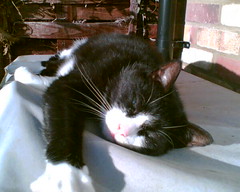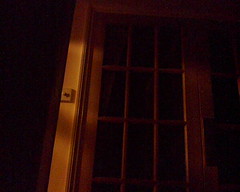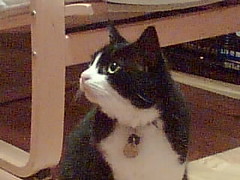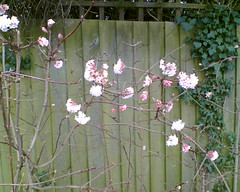Denis Again
The rain has stopped and the sky has cleared a little while I have been playing around on the trams inside the depot, and the crowds on the street is thinner now that the morning has passed. There are more women and girls on the street now, and fewer men in dark clothes and overalls. Young women seem to be gathered in little groups on the street corners, smoking cigarettes and laughing with their mouths wide open, showing their teeth and their pink tongues. Mummy would say that they were ‘common’, and that we ‘should take no notice of them – it will only encourage them if we look’. So I look at the pavement as the fat man holds my shoulder and steers me along the street. But it’s hard to look away when the fat man shouts, “Afternoon, girls!” to one of the groups as we pass, and they all laugh (everyone seems to think that he is funny, except for me). I raise my eyes and risk a look at the girls. Up close, they don’t look as young as their clothes, seen from a distance, would suggest, and some of them are very thin and unhealthy-looking, with shadows like bruises underneath their eyes, and bangles on their wrists that rattle and make their bony wrists look even thinner than they actually are. All of the women have red lips and rouged cheeks, and most of them have thick black stuff on their eyelashes, and some of them look a bit like they’ve been crying.
We cross the road, but stay on the wide main street, where the buildings are tall and dark, the brickwork and windows all stained with rain and smoke and muck. There are no shops or stalls on the ground floors: instead, there are railings that guard the fronts of the buildings, and steps up to double front doors, and steps with gates at the top that lead down into rubbish-strewn [basement thingies – what are they called?]. The ground floor windows are all tall and [curtained] with lace [? Equiv. of modern ‘nets’] curtains, but, higher up, you can look in between the metal bars and see patches of ceilings and sometimes shelves and boxes.
We walk about half a mile, and the fat man hums to himself. I suddenly think that pappi doesn’t know where I am, and that I don’t know who this man is, or where I am. I look up at him sideways and see his fat throat wobbling with each step that we take; the filled skin swells out from his collar, and I can see that he needs a shave, because there are little blonde whiskers catching the light on the curves of his throat. He looks dirty to me.
I say, “Where are we? Is it far now?”
“Nearly there now,” he says, without looking at me. He tightens his grip on my shoulder and gives it a little shake.
A minute later, we turn into a narrower side street, where there are closed up market stalls on wheels parked in the kerb, and lots of men standing smoking cigarettes in doorways. It’s much darker down this street, and it’s almost as if you’ve suddenly stepped into a different city. The fat man feels me slow down and says, “Come on, son – nearly there,” and he gets hold of the shoulder of my jacket and gives it a jerk. He pulls me to a stop by a couple wooden benches up against a wall and says, “Here. Here’s where your pappi will be.”
I look up and see that there’s a door, with big windows each side. The windows are frosted glass two thirds of the way up, and clear at the top, where I can see some red curtains pulled aside. The door is of stained wood, almost black with scratches and soaked-up rainwater, and the glass in its centre is half hidden by a nailed on piece of plywood. The visible glass is cracked and has tape on it.
The fat man steps in front of me and pushes the door open, steps half inside and then looks down at me and says, “Come on, then – here’s your pappi.” When he smiles I can see the black stumps of some of his teeth, and spit glistening in there too.
It’s gloomy inside the bar, except for a space above the men’s heads, where a layer of cigarette smoke is moving in the whitish light that comes in through the clear tops of the windows. There’s a lot of dark brown wood, and some high stools at the bar, and the glitter and sheen of bottles and glasses behind the bar, where a fat man in a white shirt with the sleeves rolled up is moving backwards and forwards, serving foam-topped beer to the men who are leaning against the metal rail that runs around the curve of the bar. The barman has the same hairstyle as my escort, and is equally fat, and I look at each of them in succession, and then back again. It makes me want to laugh, to think that these two might be brothers.




